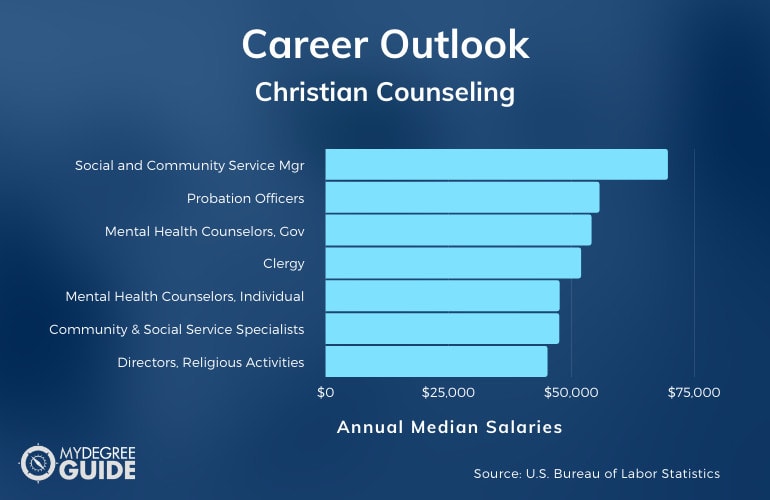If you’re interested in a career that allows you to balance principles of psychology with concepts in Christian theology, then you may want to consider earning a Christian counseling degree.

In Christian counseling programs, you can learn how to utilize religious concepts and theories to help others navigate stressful, emotional life events.
Editorial Listing ShortCode:
Completing a Christian counseling degree program can allow you to explore the relationship between psychology and religion. This can help prepare you for various roles in the Christian community.
Universities Offering Online Bachelors in Christian Counseling Degree Programs
Methodology: The following school list is in alphabetical order. To be included, a college or university must be regionally accredited and offer degree programs online or in a hybrid format.
Grace Christian University
Grace Christian University offers a Bachelor of Science in Human Services. Students must complete 120 credit hours, including a capstone project and 21 elective credits. Those interested in the program must offer proof of a high school diploma or GED, official transcripts from any institutes attended, and a ministry reference.
Grace Christian University is accredited by the Higher Learning Commission.
Houston Baptist University
Houston Baptist University offers a Christian Counseling Degree. To graduate, students must complete 125 credit hours and have a grade of C or higher in core courses. Up to 18 qualifying credits may be transferred into the program. Applicants may apply online with official high school transcripts.
Houston Baptist University is accredited by the Southern Association of Colleges and Schools Commission on Colleges.
Johnson University
Johnson University offers a Bachelor’s in Pastoral Care and Counseling. To graduate, students must complete 10 major courses, including Confict and Communication and a counseling ministry practicum course. Applicants must complete an online application and submit transcripts from all schools they’ve attended and ACT, SAT, or CLT test scores.
Johnson University is accredited by the Southern Association of Colleges and Schools Commission on Colleges.
Lancaster Bible College
Lancaster Bible College offers a Bachelor of Science in Professional Counseling and Biblical Studies. To graduate, students must complete 130 credit hours and an internship at a homeless shelter, church counseling center, or private practice. Applicants must have a high school GPA of 2.0 or higher, a spiritual life reference, and admission test scores.
Lancaster Bible College is accredited by the Middle States Commission on Higher Education.
Lee University
Lee University offers a Bachelor’s in Ministry Leadership with an emphasis in Counseling. Students must complete 120 credits to graduate, with 24 hours dedicated to counseling and 30 to ministry leadership. Applicants must have a GPA of 2.0 or higher and need to submit high school transcripts and ACT or SAT scores.
Lee University is accredited by the Southern Association of Colleges and Schools Commission on Colleges.
Liberty University
Liberty University offers a Bachelor of Science in Psychology with an emphasis in Christian Counseling. The program requires 120 credit hours to graduate and can typically be completed in 3.5 years. The online classes are 8 weeks long. Applicants must have a high school GPA of 2.0 or higher to be eligible for the program.
Liberty University is accredited by the Southern Association of Colleges and Schools Commission on Colleges.
Moody Bible Institute
Moody Bible University offers a Bachelor of Arts in Human Services. To graduate, students must complete 120 credit hours, including a summer internship in their third year. Applicants must submit a personal essay, 2 references, SAT or ACT scores, and high school transcripts to be eligible for the program.
Moody Bible Institute is accredited by the Higher Learning Commission.
Nazarene Bible College
Nazarene Bible College offers a Bachelor of Arts in Ministries with a concentration in Counseling for Christian Ministries.
To graduate, students must complete 128 credit hours. The AdVantage path can help students graduate in 2 years. Those interested in the program may apply online with their official transcripts, AdVantage students must have 5 years of work or volunteer experience as well.
Nazarene Bible College is accredited by the Higher Learning Commission.
Oral Roberts University
Oral Roberts University offers a Bachelor of Arts in Christian Caregiving and Counseling. Students must obtain 124 credits to graduate. Each term is 7 weeks long. Applicants must have a GPA of 2.6 or higher to be eligible for the program. Official transcripts and ACT or SAT scores must be submitted.
Oral Roberts University is accredited by the Higher Learning Commission.
Southwestern Assemblies of God University
Southwestern Assemblies of God University offers a Bachelor’s in Human Services with specialization options in Counseling, Psychology, and Social Work. Applicants must submit ACT, CLT, or SAT scores from the last 5 years and high school transcripts. A minimum GPA of 2.0 is required to be eligible for the program.
SAGU is accredited by the Commission on Colleges of the Southern Association of Colleges and Schools.
Online Christian Counseling Degree Programs

Earning a Christian counseling degree online can help you develop the necessary knowledge and skill set to provide help to others through faith based counseling. Christian counseling degree programs offer educational content that looks at psychology through a faith-based and Christian-based perspective or lens.
With a Christian counseling degree, you may be qualified for various roles in business, nonprofit, government, or religions institutions. Some careers in this field include:
- Pastor
- Missionary
- Social and human services assistant
- Correctional treatment specialist
- Substance abuse, behavioral disorder, and mental health counselors
- Social and community service manager
- Teaching assistant
- Clergy
- Director, religious activity and education
- Religious worker
Christian counseling programs are designed with a specific course curriculum to prepare you for the various roles in this sector. Common course topics include:
- Issues of Christian counseling
- Christian counseling for marriage and families
- Christian counseling for children
- Issues in human sexuality
Additional course topics that you may take as part of your degree include behavior management, human learning, personality development, social psychology, physiological psychology, and culture and psychology.
Earning your degree in Christian counseling online can also help prepare you for graduate-level educational programs, including masters and PhD or doctoral degree programs. A growing number of universities offer not only doctorates in Christian counseling, but also an online doctorate in theology for students wishing to earn a more religion-based degree.
Common Christian Counseling Bachelor’s Concentrations

Within a Christian counseling bachelors degree program, you may have the option to choose between different concentrations. Here are some common Christian counseling bachelors concentrations:
- Clinical Counseling. This concentration explores the fundamental principles of psychology, including behavior, interaction, and development.
- Marriage and Family Counseling. This concentration explores methods of addressing interpersonal conflict and relationship barriers for couples and families.
- Pastoral Counseling. With this concentration, you can develop an understanding of how to address situations, problems, and experiences through a faith-based, Christian perspective.
- Life Coaching. You can discover methods of supporting individuals through various life challenges, providing direction and helping them develop confidence in making decisions.
- School Counseling. You can explore concepts related to childhood development and childhood psychology as it relates to counseling of school-aged children.
The specific concentrations available to you can vary greatly depending on the school you choose to attend to complete your degree. Some programs even offer pastoral counseling degrees online or on campus for professionals interested in that area of concentration.
Christian Counseling Careers & Salaries

With a Christian counseling degree, you may find rewarding work in various industries. Work settings can include outpatient treatment facilities, hospitals, health centers, schools, religious institutions, international mission sites, government institutions, and nonprofit organizations.
According to the Bureau of Labor Statistics, a degree in Christian counseling may prepare you for various careers, ranging from those based in religion and theology to those in business, healthcare, and government.
| Careers | Annual Median Salaries |
| Social and Community Service Managers | $69,600 |
| Probation Officers and Correctional Treatment Specialists | $55,690 |
| Substance Abuse, Behavioral Disorder, and Mental Health Counselors, Government | $54,070 |
| Clergy | $51,940 |
| Substance Abuse, Behavioral Disorder, and Mental Health Counselors, Individual and Family Services | $47,580 |
| Community and Social Service Specialists | $47,500 |
| Directors, Religious Activities and Education | $45,110 |
| Social and Human Service Assistants | $35,960 |
| Religious Workers | $33,530 |
| Teacher Assistants | $28,900 |
A number of these positions are predicted to experience positive job growth over the next several years, according to the Bureau of Labor Statistics.
This includes positions like religious workers (3% job growth), directors of religious activity and education (3%), clergy (4%), correctional treatment specialists (4%), and community and social service specialists (14%).
In addition, the Bureau of Labor Statistics projects an astounding 25% job growth for substance abuse, behavioral disorder, and mental health counselors.
Christian Counseling Curriculum & Courses

When pursuing a bachelor’s degree in Christian counseling online, you’ll generally have coursework that blends content from psychology and Christian theology. This can provide you with a holistic perspective of the field.
Coursework will vary by school and program, but your classes may include:
- Christian Counseling for Marriage and Family: You’ll explore the complex dynamics of couple and family group counseling through the lens of Christianity and faith-based resolutions.
- Christian Counseling for Children: You’ll discover the stages of development, from infancy through to adulthood.
- Psychology and Christianity: This course explores the relationship and nuance that exists between the science of psychology and Christianity.
- Issues in Human Sexuality: You’ll learn about the various sexual issues that individuals may experience, ranging from sexual additions to cultural myths.
- Issues of Christian Counseling: You’ll explore different issues and considerations regarding faith-based, Christian counseling.
- Evangelism and Christian Life: You’ll discover methods and practices used to share the Christian faith with others.
- Methodical Study of Scripture: This courses teaches the different practices used to interpret and assess the Bible.
- Christian Counseling for Women: You’ll learn about theories and applications related to the counseling of women in relation to Christianity.
- Theological Interpretation of Scripture: You’ll explore scripture from the Old and New Testament through a more in-depth approach.
- Introduction to Church Ministries: You’ll discover the biblical foundations of ministry and what careers exist in church ministry settings.
In addition to completing various faith-based and psychology-based coursework, you may also be required to select a number of non-major-based elective courses to complete your degree.
How to Choose an Online Bachelor’s in Christian Counseling Program

When choosing between different Christian counseling degree programs offered by various schools, there are a number of considerations that may influence your decision:
- Accreditation status of the school
- Number of transfer credits the program will accept
- Overall cost of tuition and related fees
- Whether any on-campus time is required in an online program
- Full-time versus part-time enrollment options
- Concentrations available to you
- Internship opportunities available to you
The specific program that is right for you will often depend on how the various factors fit into your life and meet your personal, educational, and professional goals.
Admissions Requirements

When looking to enroll in a Christian counseling bachelor’s degree program, it may be necessary to meet a number of application or admission requirements in order to be accepted into a program. Common requirements include:
- High school transcripts
- Minimum GPA from high school studies
- Admissions essay
- SAT or ACT Scores (only some schools require them)
If you have previously completed any postsecondary courses, you may also be required to submit transcripts from those completed courses.
Accreditation

Regional accreditation is a status that is granted to schools that have met a predetermined set of standards in terms of the quality of their educational offerings.
Attending a school that is regionally accredited can be an important consideration. A school’s accreditation status can impact your ability to apply for graduate programs down the road, including masters- and doctorate-level degrees. Accreditation can also impact your ability to transfer credits from one school to another.
In some cases, the accreditation status of the school you attend for your undergrad can also impact your ability to become licensed in some professions. For more information on the accreditation status of schools you’re interested in attending, you can visit the US Department of Education’s website.
Christian Counseling Licensure and Certifications

Many Christian counseling majors are interested in pursuing licensure as a Christian therapist and working in Christian based counseling.
If you fall into this category, then there are a number of additional considerations for you to take into account when planning your educational journey.
While specific requirements can vary from one state to the next, it is common for you to need a master’s degree to become licensed in Christian counseling. In order to work in clinical counseling, you may be required to obtain a doctorate in psychology.
The first step in becoming licensed is to complete a bachelor’s degree program, followed by the graduate degree option that best suits your professional goals. Before being eligible for licensure, you may also need to complete a specific number of supervised work hours.
Financial Aid and Scholarships

There are a number of financial aid opportunities that may be available to help you finance your degree, including:
- Federal and state aid. Financial aid in the form of grants and loans are made available by both federal and state governments for qualifying students.
- Scholarships. Scholarships can be offered by private and public organizations.
- Work-study programs. Work-study programs are hosted by various government organizations.
- Employer training or professional development funding. This funding may be available to you if you’re currently employed and this type of program is available through your employer.
For more information on financial aid and scholarship opportunities that may be available to you, you can visit the US Department of Education’s website and fill out the Free Application for Federal Student Aid (FAFSA).
Christian Counseling Professional Organizations

Becoming involved with various Christian counseling professional organizations may be an excellent way for you to network with other professionals in the field. They can also offer access to training and conferences and help you stay up to date on emerging trends.
Some professional organizations for Christian counseling include:
- The American Association of Christian Counselors (AACC)
- International Association of Christian Counseling Professionals (IACCP)
- National Christian Counselors Association (NCCA)
These organizations may also allow you to connect with potential employers for new job opportunities.
What Is Christian Counseling?

Christian counseling is a field of study that blends the principles of psychology with an awareness and keen understanding of Christian theology.
Christian counseling focuses on providing you with a foundational understanding of psychological concepts—such as developmental psychology and couples therapy—through the lens of the Christian faith.
Topics in Christian counseling include issues in human sexuality, methodical study of scripture, interpretation of scripture, and Christian counseling for marriage, families, and children.
What Can You Do with a Christian Counseling Degree?

A bachelor’s degree in Christian counseling online can help prepare you for roles in various industries.
Some professionals with a background in Christian counseling work as pastors, directors of religious activities and education, teaching assistants, and social and human service assistants.
Other related roles include community and social service specialist, social and community service manager, correctional treatment specialist, and substance abuse, behavioral disorder, and mental health counselors.
How Long Does It Take to Get a Christian Counseling Degree Online?

The length of time that it may take you to complete a bachelor’s degree in Christian counseling online can vary depending on a number of factors. These factors can include enrollment in an accelerated program, attendance frequency, and internship requirements.
Traditionally, bachelor programs require you to complete 120 credit hours. When attending on a full-time basis with traditional 16 week semesters, it often takes 4 years to complete.
By enrolling in an accelerated program, completing courses that are only 8 weeks in length, and staying enrolled continuously year-round, you may be able to graduate in less time. Enrolling on a part-time basis or completing an internship as part of your degree may extend the amount of time required to graduate.
What Degree Do You Need to Be a Christian Counselor?

A masters degree is typically required to become a licensed Christian counselor. In order to be eligible for licensure, many states also require the completion of a certain number of supervised hours in the field.
So, completing your master’s degree and supervised work hours can often put you in a position to apply for licensure as a non-clinical Christian counselor. Licensed Christian counselors tend to support individuals who are experiencing stressful and emotional life circumstances or those who are experiencing mental health or addiction issues.
How Much Do Christian Counselors Make?

The earnings of a Christian counselor can vary greatly, depending on the specific role and industry they work in. For example, the median salary for substance abuse, behavioral disorder, and mental health counselors is $47,660 (Bureau of Labor Statistics).
Most of these professionals earn between $30,590 and $78,700 per year. Directors of religious activities and education make a median of $45,110, and social and community services managers make a median of $69,600 per year.
With a master’s degree and a license to practice, a Christian counselor may qualify for positions like marriage and family therapist or school and career counselor. Those positions earn a median of $51,340 and $58,120, respectively (Bureau of Labor Statistics).
What’s the Difference Between Christian Counseling vs. Biblical Counseling?

While Christian counseling and Biblical counseling are strongly related and have areas of overlap—both pulling on insights from the Bible—they do have key differences.
- Christian counseling: Christian counseling blends insight and knowledge from Christianity and psychology. It uses information from both sources to provide counsel to various populations.
- Biblical counseling: Biblical counseling focuses solely on insights from the Bible and Christianity, without consideration for psychological perspectives or knowledge.
The type of counseling career that is right for you will largely depend on your interests and careers goals.
Is a Christian Counseling Degree Worth It?
Yes, a Christian counseling degree is worth it for many students. According to the Bureau of Labor Statistics, a number of careers in the field of Christian counseling are expected to experience job growth over the next ten years.
This includes positions like religious workers (3% job growth), directors of religious activity and education (3%), clergy (4%). Substance abuse, behavioral disorder, and mental health counselors are expected to experience 25% job growth, which is much faster than the average for all occupations (Bureau of Labor Statistics).
Getting Your Degree in Christian Counseling Online

Christian counselors help people navigate challenging life circumstances, from marriage and family issues to mental health and addiction problems.
A bachelor’s degree in Christian counseling blends psychological studies of human development and behavior with insights and perspectives from Christian theology. Training in Christian counseling may allow you to benefit from diverse career opportunities with promising job outlooks.
If you are more interested in an online degree in religious studies, in addition to Christian counseling, a number of universities also offer online theology degree programs.
If you earn your degree online, you can schedule your studies around your lifestyle. There are many accredited schools that offer credible and convenient online counseling degrees.
A growing number of universities also offer a masters in counseling online for students wanting to pursue graduate-level studies. Plus, some even offer a Christian psychology degree online for students wishing to enter this field.
Why not start exploring your options today?
